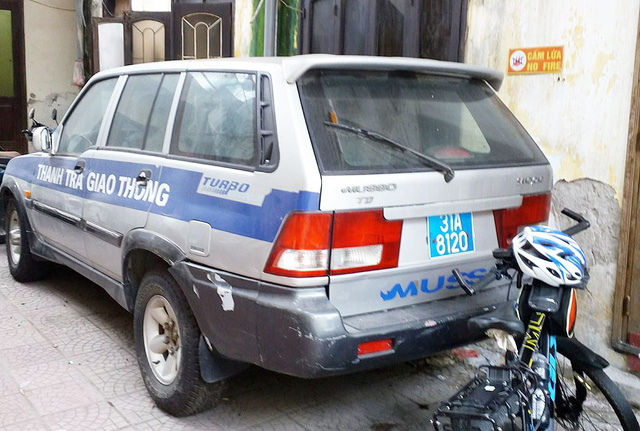Lack of equipment weakens Vietnam’s railway inspectorate
Railway inspectors occasionally have
to use a bicycle or motorbike taxi on duty, and ‘analyze’ blood alcohol
content by their eyes and noses

A broken-down car given
to the Vietnamese railway inspectorate lies disused at a headquarters of the
body in Hanoi, Vietnam. Photo: Tuoi Tre
Vietnamese railroad inspectors have
encountered a number of problems stemming from inadequate equipment of
vehicles and tools for the job to the detriment of their statutory power.
Railway
inspectors, by law, act as advisors to the Vietnam Railway Authority and
Ministry of Transport in railroad safety nationwide, but this role is not
matched by what they have had and done.
Vietnam’s 58
railway inspectors, assigned to work in the country’s northern, central and
southern regions, have never had their own headquarters for 13 years since
the inception of their inspection body.
Instead the
offices are based in buildings of member companies of the state-run Vietnam
Railways, the operator of the north-to-south rail system.
This appears
to be a deliberate arrangement, as the railway officials are also supposed to
find wrongdoings in these very firms.
The
inspectorate, whose monthly salary is around VND5 million (US$220), cover
offenses like impinging on railway track zone, damaging railroad protective
structures, and failing to abide by railroad regulations.
Around 85
percent of those booked for breach railway safety regulations in 2015 were
members of the public, while railway workers and companies under the Vietnam
Railways accounted for eight percent and three percent, respectively.
Also in
2015, it was estimated that each inspector were responsible for managing over
100 kilometers of Vietnam’s 1,730-kilometer lifeline railway, which was
daunting as the line partly stretches through many remote, mountainous
regions inaccessible by other means of transport.
Even so, the
inspectors have not been provided with sufficiently functional vehicles for
unexpected patrols.
One of their
three given cars has been severely broken-down, while the others were
returned to the government due to being not registered.
The
officials are occasionally seen riding bicycles, motorcycles, motorbike taxis
or buses as the transport modes during their duty.
They also
have no cameras, voice recorders and breathalyzers, which can explain why
arguments between them and supposed violators occur quite frequently.
Violation
notices they issue often contains very general information about the offence,
for instance, ‘this person has used alcohol.’
“We wrote
down violations that way because we had to estimate blood alcohol content
only by eye and notice alcohol by nose,” an inspector said.
Furthermore,
the inspectorate are allowed to hand out only fines under VND500,000 ($22),
and larger financial penalties must be levied by their superior – the head of
the Vietnam Railway Authority.
This force
failed to contribute to an investigation into a high-profile case late last
year, involving a near head-on collision between two trains due to the
high-profile malfunction of China-installed railroad switch system then
worthy over VND2 trillion ($88 million).
Ill-equipped,
the railroad inspectors have compared unfavorably with their counterparts,
who patrol inland waterways, or deal with aviation or maritime missteps.
Tuoi Tre News
|

Không có nhận xét nào:
Đăng nhận xét